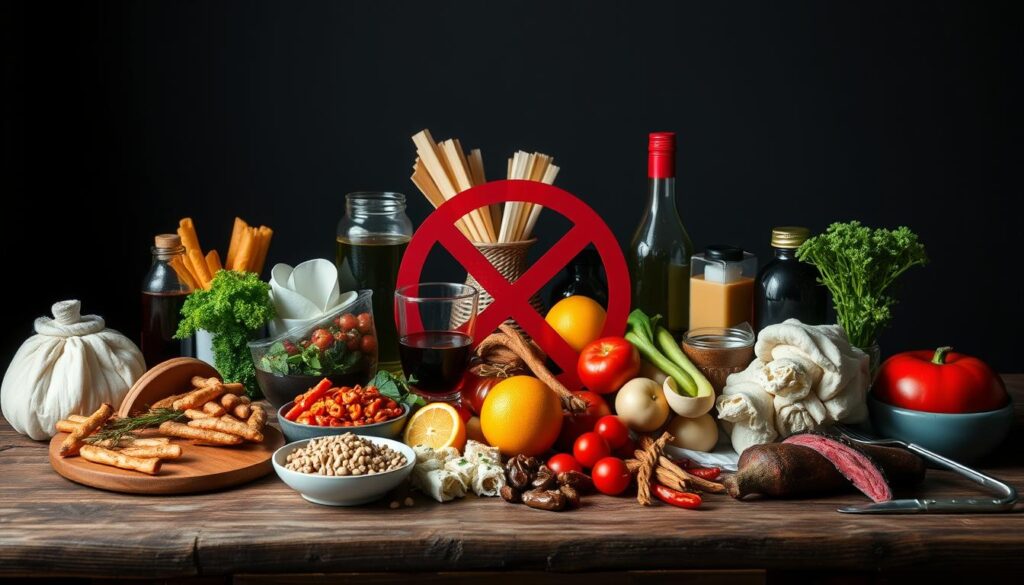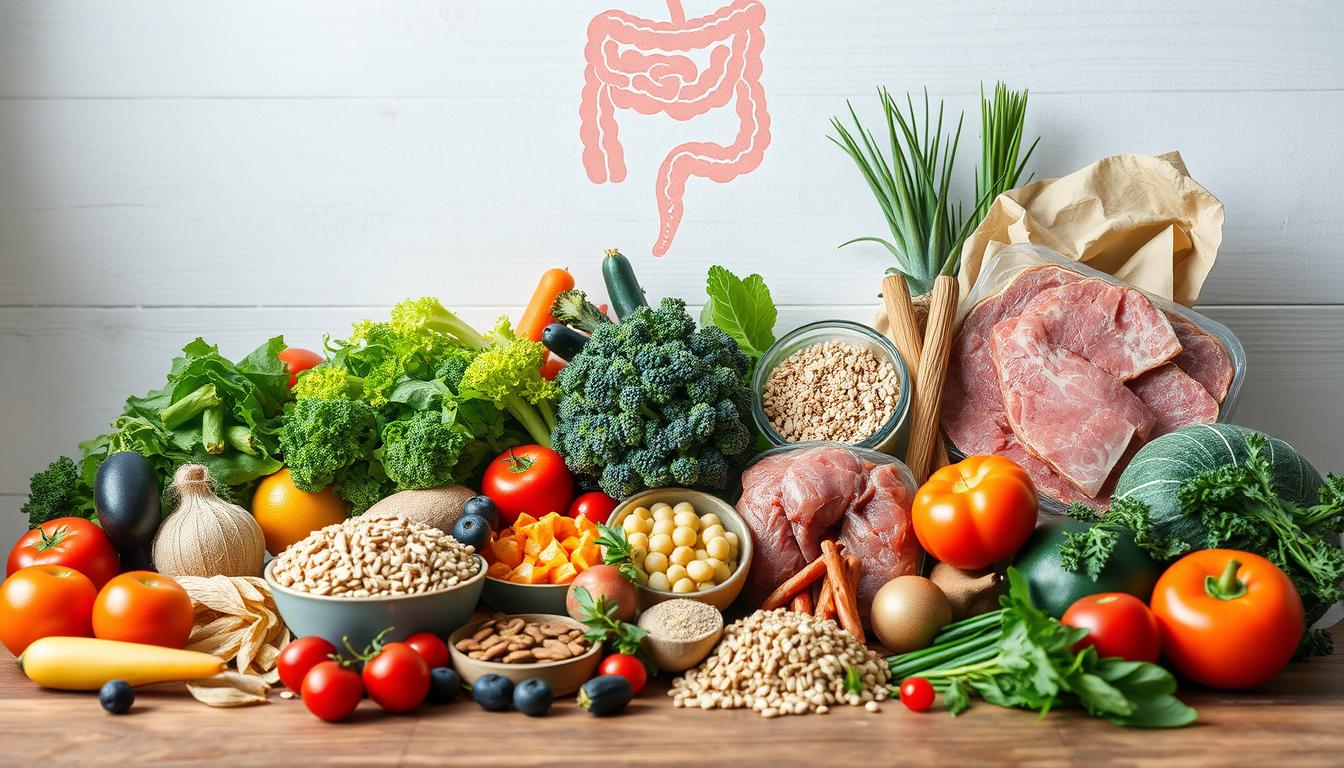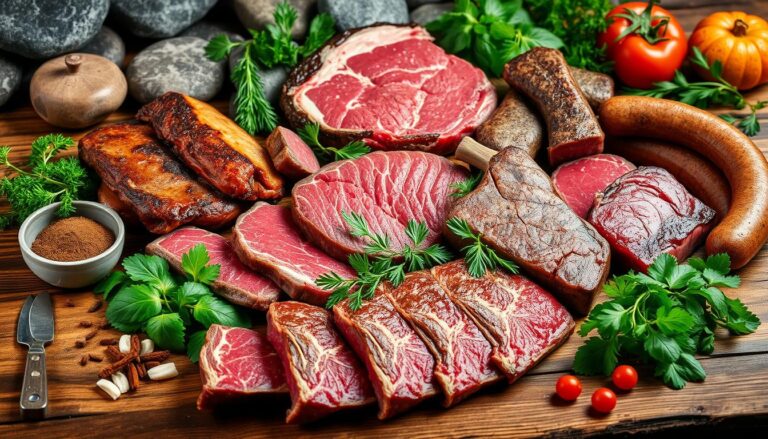Top Dietary Tips for Ulcerative Colitis
Living with ulcerative colitis (UC) is like trying to find your way through a maze. Food is more than just something to eat; it’s a key part of managing your health. The right foods for UC aren’t about cutting things out. It’s about knowing how different foods affect your body.
Think about taking back control of your symptoms with the right foods. There’s no single diet for everyone with UC. Instead, it’s about finding what works best for you to feel better and live more confidently.
Your diet can be a big help in fighting inflammation and easing symptoms. By choosing the right foods, you can help your body heal. This makes your diet a powerful tool for your overall health.
Table of Contents
Understanding Ulcerative Colitis and Nutrition
Living with ulcerative colitis (UC) means you have to understand how diet affects your digestive health. It’s important to know how nutrition impacts your symptoms and overall health.
What is Ulcerative Colitis?
Ulcerative colitis is a chronic condition that affects the colon and rectum. It causes inflammation and ulcers, leading to symptoms like abdominal pain and diarrhea. Knowing how diet affects UC can greatly improve your life.
How Diet Affects UC Symptoms
Your diet is key in managing UC symptoms. Some foods can trigger inflammation, while others can help. Choosing the right foods can reduce inflammation and support your gut health.
- Omega-3 rich foods like salmon can help reduce inflammation
- Probiotic-rich foods such as Greek yogurt may improve gut health
- Colitis-friendly foods include nutrient-dense options like hummus and avocado
The Role of Inflammation in UC
Inflammation is what drives UC symptoms. Your immune system attacks healthy cells, causing inflammation. Diet can help manage this:
“Nutrition is a powerful tool in managing inflammatory bowel disease” – Gastroenterology Experts
- Reduce inflammatory triggers
- Incorporate anti-inflammatory foods
- Support gut microbiome balance
Research shows that certain diets can control inflammation and help with medication. By choosing nutrient-rich, gut-friendly foods, you can manage your UC symptoms.
Mediterranean Diet Benefits for UC Management
Managing ulcerative colitis through diet is key. The Mediterranean diet is a strong choice for those looking to improve gut health and lower inflammation. It focuses on foods that are good for the gut and help fight inflammation.
Studies show the Mediterranean diet can help with inflammatory diseases. From 2019-2024, research found many benefits for ulcerative colitis patients. These benefits are important for managing the condition.
- Rich in plant-derived proteins with anti-inflammatory properties
- Contains omega-3 polyunsaturated fats that help reduce intestinal inflammation
- Emphasizes whole foods that support gut microbiota balance
Recipes inspired by the Mediterranean diet are great for ulcerative colitis. They include important ingredients like:
- Extra virgin olive oil (contains anti-inflammatory polyphenols)
- Fresh fish (provides omega-3 fatty acids)
- Nuts and seeds (support gut health)
- Colorful fruits and vegetables
“The Mediterranean diet offers a holistic approach to managing inflammatory conditions through nutrition” – Nutritional Research Institute
Key nutrients in this diet are powerful for managing ulcerative colitis. They include:
| Nutrient | Potential Benefits | Food Sources |
|---|---|---|
| Resveratrol | Reduces intestinal inflammation | Red wine, grapes |
| Omega-3 | Decreases inflammatory markers | Fatty fish, chia seeds |
| Polyphenols | Supports gut microbiome | Olive oil, fruits |
Note: Always consult your healthcare provider before making significant dietary changes with ulcerative colitis.
Foods for Ulcerative Colitis During Remission
Managing ulcerative colitis during remission needs a smart nutrition plan. Your diet is key to keeping your gut healthy and avoiding flare-ups. Knowing the best foods for ulcerative colitis helps you make choices that support your health.
Anti-inflammatory Food Choices
Choosing foods that fight inflammation is important for your digestive health. Some nutrients can help manage UC symptoms during remission:
- Fatty fish rich in omega-3s (salmon, mackerel, sardines)
- Leafy green vegetables
- Berries packed with antioxidants
- Nuts and seeds with anti-inflammatory properties
Nutrient-Rich Options
Eating foods rich in nutrients helps your body heal. Here are some good choices:
- Lean proteins like chicken and turkey
- Whole grains in moderation
- Cooked vegetables that are easier to digest
- Low-fat dairy or dairy alternatives
Portion Control Guidelines
It’s important to control your meal sizes if you have ulcerative colitis. Eating small, frequent meals can help avoid digestive stress.
| Meal Strategy | Recommended Approach |
|---|---|
| Meal Frequency | 5-6 small meals per day |
| Portion Size | 1/2 to 3/4 of typical meal size |
| Fiber Introduction | Gradually increase to prevent discomfort |
“Personalization is key in managing ulcerative colitis through diet. What works for one person may not work for another.” – Gastroenterology Nutrition Specialist
Remember, individual responses to foods can vary. Talking to a registered dietitian can help you create a nutrition plan that fits your needs during UC remission.
Managing UC Flare-Ups Through Diet
When you’re in a flare-up, what you eat is key. The right foods can help lessen inflammation and give you the nutrients you need. They also help ease your digestive system.
“Nutrition is a powerful tool in managing ulcerative colitis flare-ups,” says gastroenterology experts.
Here are some tips for your diet during a flare-up:
- Choose easily digestible, low-fiber foods
- Opt for soft, well-cooked proteins
- Stay hydrated with clear liquids
- Consume nutrient-dense foods in small portions
Your diet should focus on foods that are easy on your stomach. Recommended foods include:
| Food Category | Best Choices |
|---|---|
| Proteins | Soft-cooked chicken, fish, tofu |
| Liquids | Smoothies, bone broth, clear soups |
| Nutrient-Dense Options | Greek yogurt, hummus, nut butters |
Even if you don’t feel like eating, it’s important to keep up with nutrition. The American Gastroenterological Association suggests eating small, easy-to-digest meals often. Try to avoid foods that can make symptoms worse, like raw veggies, whole nuts, and spicy foods.
Keep in mind, everyone’s experience with UC is different. Talk to a healthcare professional to create a diet plan that fits your needs.
Essential Nutrients and Supplements for UC
Nutrition is key in managing ulcerative colitis. Your diet can greatly affect your symptoms and health. Knowing the right nutrients and supplements is important for your ulcerative colitis diet.
Key Vitamins and Minerals for UC Patients
Adults with ulcerative colitis often lack certain nutrients. This is due to inflammation and dietary limits. Focus on these key nutrients:
- Calcium: Essential for bone health
- Vitamin D: Supports immune function
- Iron: Prevents anemia
- Folate: Supports cell growth
- Zinc: Aids in wound healing
Omega-3 Fatty Acids and Inflammation
Fish oil and flaxseed oil can reduce colon inflammation. Nutrition for ulcerative colitis benefits from omega-3 sources like:
- Salmon
- Mackerel
- Sardines
- Fish oil supplements
Probiotic Supplementation
Probiotics help balance gut bacteria and may reduce inflammation. Studies show promising results for managing ulcerative colitis diet with targeted probiotics.
| Nutrient | Recommended Daily Intake | Benefits |
|---|---|---|
| Vitamin D | 600-800 IU | Immune system support |
| Calcium | 1000-1200 mg | Bone health |
| Zinc | 8-11 mg | Healing and immune function |
“Always consult your healthcare provider before starting any supplement regimen.” – Crohn’s & Colitis Foundation
Remember, everyone’s nutritional needs are different. Work with a healthcare professional to create a personalized nutrition plan for managing ulcerative colitis.
Foods and Beverages to Avoid with UC

Managing your ulcerative colitis diet is key. Knowing which foods to avoid can help reduce inflammation and symptoms.
“Your diet plays a critical role in managing ulcerative colitis symptoms and maintaining gut health.”
Certain foods can make inflammation and discomfort worse. A smart diet can help control flare-ups and improve digestion.
Key Foods to Avoid During UC Flare-Ups
- Dairy products (specifically for those who are lactose-intolerant)
- Spicy foods that irritate the digestive tract
- High-fat and processed foods
- Alcohol and caffeine
- Sugary drinks and processed snacks
When you’re having a flare-up, your digestive system is more sensitive. Some foods can make inflammation worse and symptoms more severe.
| Food Category | Potential Impact on UC |
|---|---|
| Saturated Fats | Increases inflammatory responses |
| Refined Sugars | Disrupts gut bacteria balance |
| Alcohol | Irritates digestive system |
| Caffeine | Increases bowel movement frequency |
Remember, individual triggers can vary. Keeping a food journal can help you identify your specific dietary sensitivities.
Talking to a registered dietitian who knows about inflammatory bowel diseases is a good idea. They can create a diet plan that helps manage symptoms and ensures you get the nutrients you need.
Meal Planning Strategies for UC Patients
Managing ulcerative colitis through meal planning can greatly improve your comfort and health. A thoughtful approach to foods helps reduce symptoms and supports your digestive system.
Timing Your Meals Strategically
Eating smaller, more frequent meals can help manage ulcerative colitis symptoms. Here are some timing tips:
- Aim for 4-6 smaller meals throughout the day
- Space meals approximately 3-4 hours apart
- Avoid large meals that overwhelm your digestive system
- Listen to your body’s hunger and fullness signals
Portion Control Guidelines
Portion control is key when preparing meals for ulcerative colitis. Follow these guidelines:
- Use smaller plates to naturally reduce portion sizes
- Measure ingredients to ensure consistent portions
- Start with half the portion you typically consume
- Chew food thoroughly to aid digestion
Meal Prep Tips for UC Patients
Effective meal preparation can make managing your diet easier:
- Cook vegetables until soft for easier digestion
- Use gentle herbs instead of spicy seasonings
- Prepare lean proteins like chicken or fish
- Plan meals in advance to reduce stress
“Proper meal planning is your first line of defense in managing ulcerative colitis symptoms.” – Digestive Health Experts
By using these strategies, you can create a supportive diet. It helps manage your ulcerative colitis while ensuring proper nutrition and comfort.
Hydration and Lifestyle Considerations

Managing ulcerative colitis isn’t just about what you eat. Staying hydrated and living a healthy lifestyle are key to controlling symptoms and staying healthy.
Hydration Strategies
Drinking enough water is vital for those with ulcerative colitis. It helps keep your digestive system working right and prevents problems. Here’s how to stay hydrated:
- Drink at least 64 ounces of fluid daily
- Choose water, herbal teas, and clear broths
- Avoid caffeine and alcohol during flare-ups
Stress Management Techniques
Stress can make managing ulcerative colitis harder. Studies show that stress can even trigger flare-ups. So, finding ways to reduce stress is important.
- Practice deep breathing exercises
- Engage in regular meditation
- Join support groups
- Consider gentle physical activities
“Your lifestyle choices can be powerful allies in managing ulcerative colitis.” – UC Research Consortium
Exercise and UC
A 2018 review found that exercise can help with ulcerative colitis. It can reduce symptoms, boost your immune system, and improve your quality of life.
| Exercise Type | Benefits for UC |
|---|---|
| Low-impact walking | Reduces inflammation, improves mood |
| Swimming | Gentle on joints, enhances cardiovascular health |
| Yoga | Stress reduction, improved flexibility |
Always talk to your healthcare provider before starting any new exercise or diet plan for managing ulcerative colitis.
Conclusion
Managing ulcerative colitis through diet needs a personal touch. With nearly 900,000 people in the United States affected, finding the right nutrition is key. Your diet can greatly affect how you feel and your health.
Finding the right foods for ulcerative colitis isn’t easy. Research shows that things like your background and gut bacteria matter. Working with doctors and dietitians can help you find a diet that fits you.
Diet is just part of managing UC. Nutrition is important, but it works with medicine and lifestyle changes too. By staying informed and listening to your body, you can manage your symptoms better.
As research grows, so does hope for better nutrition in UC. Stay active, listen to your body, and talk to your healthcare team. This will help you manage your condition better.


